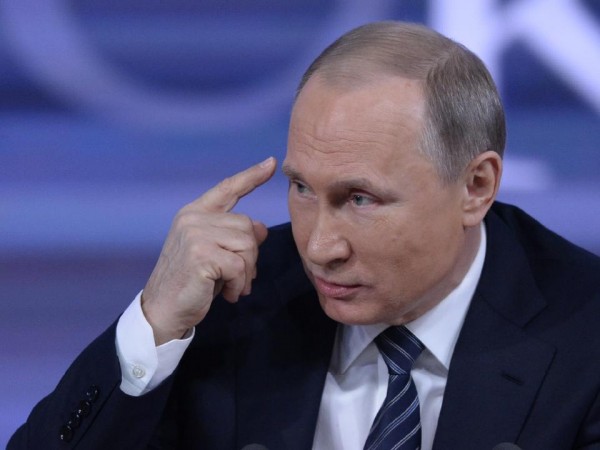
MOSCOW (AP) — Having Donald Trump in the White House is looking increasingly like a liability for the Kremlin, rather than an asset. But don’t expect President Vladimir Putin to say that out loud.
Russia’s official assessment of Trump’s high-stakes summit with Putin is carefully upbeat. In his first public comment on it, Putin on Thursday declared it “successful.”
That stands in sharp contrast to the rain of criticism the U.S. president has faced at home. And as the days pass and Trump’s comments about Monday’s summit become more and more contradictory, Moscow appears to be quietly losing hope for a thaw in Russian-U.S. ties under Trump.
Putin doesn’t blame Trump for that. He blames Trump’s opponents.
“Certain forces are trying to disavow the results of the meeting in Helsinki,” and hamper progress on what they discussed, such as limiting their nuclear arsenals or ending the war in Syria, Putin said.
In a meeting at the Foreign Ministry with Russia’s ambassadors to other countries, Putin warned them to “take to this into account” in dealing with the U.S.
The U.S.-Russia relationship is “in some ways worse than during the Cold War,” Putin said, “It’s naive to think that the problems would be solved in a few hours.”
The Helsinki summit allowed them to start on “the path to positive change,” he said, but added that he was cautious about the longer term.
“We will see how things develop further,” Putin said, evoking those in the U.S. trying to prevent any improvement in relations and “putting narrow party interests above the national interest.”
The lively debate in Washington is unthinkable in Russia, where Putin has never faced real political opposition and leads a country that has never had a democratic transition of power.
While he and Trump seem to be cut from the same cloth, they come from very different worlds.
In public, Russian officials have been consistent in their praise of the summit and criticism of Trump’s opponents, while also exercising caution about taking aim at Trump himself.
Behind the scenes, however, some members of the political and business elite have a different assessment.
“Trump’s behavior was a total disaster for long-term prospects of the normalization of the U.S.-Russia relationship,” said Alexander Gabuev of the Carnegie Moscow Center.
Trump has come under widespread domestic criticism about the meeting with Putin both from Democratic opponents and some Republicans. He has made contradictory statements over whether he believes Russia interfered in the 2016 U.S. election.
“He’s made things much worse,” Gabuev said.
Trump tweeted Thursday that his critics in the media “are pushing so recklessly hard and hate the fact that I’ll probably have a good relationship with Putin.”
Indeed, when Trump came to office, many Russians hoped he would pave the way for lifting sanctions and ending years of tensions. But now, Gabuev said, “whether this bet on Trump for the long term is a smart one is hard to see.”
In a possible dig at Trump’s unpredictable presidency, Putin on Thursday lauded Russia’s “consistent, responsible, independent foreign policy.”
Putin had both good and bad things to say about Trump in a broad speech about foreign policy.
The Russian leader praised Trump’s mediation efforts in North Korea, but slammed his protectionist trade policies and the decision to pull out of the international accord curbing Iran’s nuclear activities.
He also lashed out at Europe and U.S.-dominated NATO, saying Russia would hit back with an “equivalent response” to the alliance’s bases near Russia’s borders and other “aggressive steps.” He didn’t elaborate.
Russian politicians also criticized proposals by U.S. lawmakers to question Trump’s interpreter from the Helsinki summit about what topics the men discussed privately.
At his joint news conference with Putin, Trump said they discussed Syria “at length” but was vague about the outcome. The Russian Defense Ministry has said it is ready to implement what it called agreements on increased cooperation with the U.S. military in Syria. But U.S. Defense Secretary Jim Mattis has given no public indication since the summit of plans to work more closely with the Russian military in Syria.
Konstantin Kosachev, head of the upper house of the Russian parliament’s foreign affairs committee, said the idea of questioning the translator about what was said privately sets a dangerous precedent that threatens the “the whole idea of diplomacy,” according to Russian news agencies.
Kosachev also said if the summit turns out to be a failure, it won’t be the fault of Putin or Trump.
“There is no doubt about the Russian side’s ability and readiness to fulfill the results of this summit, but there is doubt regarding the American side, and it not is connected to things President Trump personally wants to achieve or avoid,” he said.
“It is connected to his ability to fulfill these agreements, which, to my mind, is artificially restricted by the U.S. Congress and some U.S. agencies, let alone intelligence services,” Kosachev added.
If Putin’s speech to the envoys raised serious issues, the Foreign Ministry, known by its Russian acronym MID, used the occasion to make a sardonic quip.
Its official Twitter account posted a photo of a long line of the ambassadors heading into the Putin speech at the ministry’s ornate headquarters. The caption, accompanied by a winking emoji, said: “When you can’t wait to meddle in someone’s elections — Russian diplomats going to work at MID.”
AP

Leave a Reply